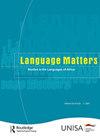Lexical Variation in Regional Modern Standard Arabic
IF 0.8
3区 文学
0 LANGUAGE & LINGUISTICS
引用次数: 0
Abstract
Abstract Adapting the notions of regional Modern Standard Arabic (Ibrahim 2009; Ryding 2010) and gradience in acceptability judgments (Papadopoulou, Leivada, and Pavlou 2014), this paper teases apart educated native speakers’ judgements and lexical preferences in an intricate case of lexical collocations. In this case, one of the two co-occurring words or constituents has two variants rendered in different morphological forms, but they are derived from the same root. The results of an acceptability judgment task showed that educated Saudi Arabian speakers tended to disfavour lexical variants used in Egyptian newspapers and overwhelmingly opted for the variants used in their region when forced to do so. It is argued that although the lexicon of Standard Arabic is relatively stable and governed by substantial regularities and conformities to standard morphological rules, still regional varieties can be differentiated. The dynamic nature of Standard Arabic synchronically and its interaction with Arabic dialects in different regions is discussed.区域现代标准阿拉伯语的词汇变异
摘要本文根据区域现代标准阿拉伯语(Ibrahim 2009;Ryding 2010)和可接受性判断的等级性(Papadopoulou,Leivada,and Pavlou 2014)的概念,在一个复杂的词汇搭配案例中,对受过教育的母语人士的判断和词汇偏好进行了梳理。在这种情况下,两个同时出现的单词或成分中的一个有两个变体,以不同的形态呈现,但它们源自同一个词根。可接受性判断任务的结果表明,受过教育的沙特阿拉伯人倾向于不喜欢埃及报纸上使用的词汇变体,并在被迫这样做时,绝大多数人选择了所在地区使用的变体。有人认为,尽管标准阿拉伯语的词汇相对稳定,并受到实质性规则和符合标准形态规则的支配,但仍然可以区分区域变体。讨论了标准阿拉伯语的动态共时性及其与不同地区阿拉伯语方言的互动关系。
本文章由计算机程序翻译,如有差异,请以英文原文为准。
求助全文
约1分钟内获得全文
求助全文
来源期刊

Language Matters
Multiple-
CiteScore
1.20
自引率
0.00%
发文量
19
期刊介绍:
The purpose of Language Matters is to provide a journal of international standing with a unique African flavour focusing on multilingualism in Africa. Although the journal contributes to the language debate on all African languages, sub-Saharan Africa and issues related to multilingualism in the southern African context are the journal’s specific domains. The journal seeks to promote the dissemination of ideas, points of view, teaching strategies and research on different aspects of African languages, providing a forum for discussion on the whole spectrum of language usage and debate in Africa. The journal endorses a multidisciplinary approach to the study of language and welcomes contributions not only from sociolinguists, psycholinguists and the like, but also from educationalists, language practitioners, computer analysts, engineers or scholars with a genuine interest in and contribution to the study of language. All contributions are critically reviewed by at least two referees. Although the general focus remains on multilingualism and related issues, one of the three issues of Language Matters published each year is a special thematic edition on Language Politics in Africa. These special issues embrace a wide spectrum of language matters of current relevance in Southern Africa.
 求助内容:
求助内容: 应助结果提醒方式:
应助结果提醒方式:


